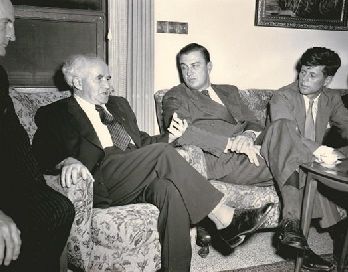At what cost has the U.S. acted as if the Israel lobby is not a foreign agent?
 David Ben-Gurion, Franklin Delano Roosevelt, Jr., and Congressman John Kennedy. It was taken in Ben-Gurion's Jerusalem home in early October 1951. Bobby Kennedy was also there, but is not in the photo. Courtesy: intifada-palestine.com |
More than 46 years ago, President John F. Kennedy sought to preclude a nuclear arms race in the Middle East. In June 1963, he wrote the last in a series of insistent letters to Israeli Prime Minister David Ben-Gurion. Those letters sought what Israel now demands of Iran: international inspections of its nuclear facilities. The key difference: Kennedy knew for certain that Israel, while portraying itself a friend and ally, repeatedly lied to Kennedy about its nuclear weapons development at the Dimona reactor in the Negev Desert.
... During this same 1962-63 period, Senator William J. Fulbright of Arkansas, chairman of the Committee on Foreign Relations, convened hearings on the legal status of the American Zionist Council. The AZC received funds from the Jewish Agency, a predecessor to the state of Israel. As a recipient of U.S. taxpayer funds, the Jewish Agency used those funds to lobby for more funds. Under U.S. law, that conduct required the AZC to register as a foreign agent.
Attorney General Robert Kennedy joined Fulbright in that quest. That effort was thwarted by the Israel lobby and then by the death of President Kennedy. Thereafter, concerns about the impact of Zionist influence on U.S. policy making continued to grow. By 1973, Fulbright could announce with confidence: “Israel controls the U.S. Senate.” In 1974, he lost his Senate seat.
Fast-forward to today and imagine the Middle East without an enclave of nuclear-armed Zionist extremists. The threat that Kennedy posed to Tel Aviv’s arsenal was eliminated five months after Ben-Gurion’s strategically well-timed resignation. When Vice President Lyndon Johnson was sworn in as his successor, LBJ quickly increased the arms budget for Israel. Imagine today’s Zionist influence on U.S. policy had Fulbright and the Kennedys succeeded in requiring that the lobby register as what it is: a foreign agent. Full story







